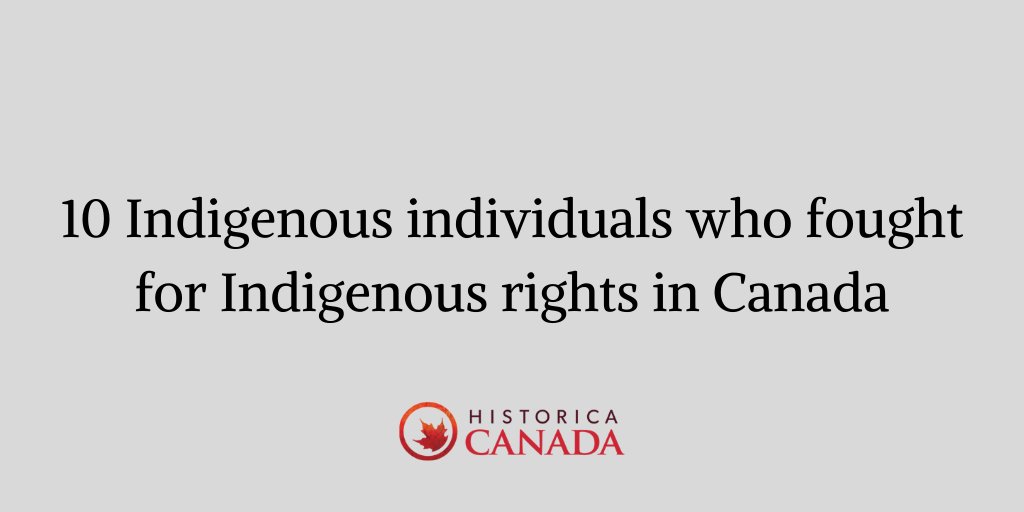June 21 is National #IndigenousPeoplesDay  https://abs.twimg.com/hashflags... draggable="false" alt="">. Take the time to learn about 10 Indigenous individuals who fought for the advancement of Indigenous rights in Canada in the thread below. #NIPDCanada
https://abs.twimg.com/hashflags... draggable="false" alt="">. Take the time to learn about 10 Indigenous individuals who fought for the advancement of Indigenous rights in Canada in the thread below. #NIPDCanada
Catharine Sutton, also known as Nahneebahwequa, fought for #IndigenousRights during a time when assimilationist policies deprived Indigenous peoples of their traditional lands and customs. In 1860, she met Queen Victoria to advocate for her Ojibwe people. https://www.thecanadianencyclopedia.ca/en/article/catherine-sutton">https://www.thecanadianencyclopedia.ca/en/articl...
In 1918, Fred Loft founded the League of Indians of Canada, the first pan-Indigenous organization in Canada. Loft pushed for the improvement of education for Indigenous peoples and spoke out against the poor and unequal treatment of Indigenous veterans. https://www.thecanadianencyclopedia.ca/en/article/fred-loft">https://www.thecanadianencyclopedia.ca/en/articl...
The Métis community hails Jim Brady as one of the most influential political figures and a key player in the Métis liberation movement. His radical politics of the 1930s tried in vain to persuade the CCF in SK to implement progressive Indigenous policies. https://thecanadianencyclopedia.ca/en/article/jim-brady">https://thecanadianencyclopedia.ca/en/articl...
In 1949, Frank Calder became the first Indigenous member of a Canadian legislature. Not only did he help the Nisga’a nation realize justice, he set in motion the process by which the federal gov& #39;t came to recognize Aboriginal title in modern Canadian law. https://thecanadianencyclopedia.ca/en/article/frank-calder">https://thecanadianencyclopedia.ca/en/articl...
Mary Two-Axe Earley spent much of her life fighting against the injustices that the #IndianAct created for Status Indian women, particularly in the 1960s regarding the denial of status, treaty and property rights for Status Indian women who “married out.” https://www.thecanadianencyclopedia.ca/en/article/mary-two-axe-earley">https://www.thecanadianencyclopedia.ca/en/articl...
In 1963, Maria Campbell founded the first Women’s Halfway House and the first Women and Children’s Emergency Crisis Centre in Edmonton. Campbell’s memoir Halfbreed (1973) is regarded as a foundational piece of #IndigenousLiterature in Canada. https://www.thecanadianencyclopedia.ca/en/article/maria-campbell">https://www.thecanadianencyclopedia.ca/en/articl...
WWII veteran Bertha Clark-Jones advocated for the fair treatment of Indigenous ex-service people. In 1968, she co-founded the Voice of Alberta Native Women’s Society, which helped Status/Non-Status women achieve equal rights under the Indian Act. https://www.thecanadianencyclopedia.ca/en/article/bertha-clark-jones">https://www.thecanadianencyclopedia.ca/en/articl...
Tagak Curley helped to form what is now @ITK_CanadaInuit in 1971 and was its first president. The ITK is a national advocacy organization that promotes awareness about political, social, cultural and environmental issues that impact Inuit communities. https://www.thecanadianencyclopedia.ca/en/article/tagak-curley">https://www.thecanadianencyclopedia.ca/en/articl...
Gertrude Guerin was the first female chief of the Musqueam First Nation and a fierce protector of Indigenous peoples and culture. In the 1980s, she represented the Musqueam nation in challenges to Canadian jurisdiction over traditional Musqueam territory. https://www.thecanadianencyclopedia.ca/en/article/gertrude-guerin">https://www.thecanadianencyclopedia.ca/en/articl...
Throughout her life, Rosemarie Kuptana fought for the self-determination of Inuit peoples and for increased Inuktitut-language broadcasting. In 2000, she began advocating for the use of traditional Inuit knowledge in battling the effects of climate change. https://www.thecanadianencyclopedia.ca/en/article/rosemarie-kuptana">https://www.thecanadianencyclopedia.ca/en/articl...
This list is by no means exhaustive. For more resources to learn about Indigenous history in Canada, check out this thread: https://twitter.com/HistoricaCanada/status/1268607732812259328">https://twitter.com/Historica...

 Read on Twitter
Read on Twitter . Take the time to learn about 10 Indigenous individuals who fought for the advancement of Indigenous rights in Canada in the thread below. #NIPDCanada" title="June 21 is National #IndigenousPeoplesDay https://abs.twimg.com/hashflags... draggable="false" alt="">. Take the time to learn about 10 Indigenous individuals who fought for the advancement of Indigenous rights in Canada in the thread below. #NIPDCanada" class="img-responsive" style="max-width:100%;"/>
. Take the time to learn about 10 Indigenous individuals who fought for the advancement of Indigenous rights in Canada in the thread below. #NIPDCanada" title="June 21 is National #IndigenousPeoplesDay https://abs.twimg.com/hashflags... draggable="false" alt="">. Take the time to learn about 10 Indigenous individuals who fought for the advancement of Indigenous rights in Canada in the thread below. #NIPDCanada" class="img-responsive" style="max-width:100%;"/>


